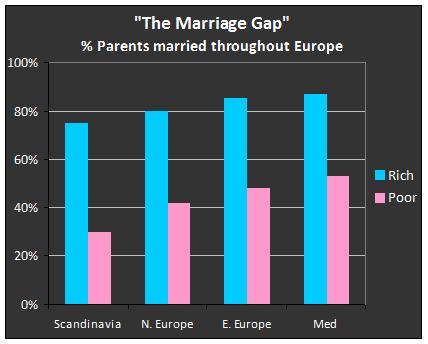Everyone knows that fewer people get married these days.
This has become an increasingly serious problem for the simple reason that most couples who don’t marry don’t stay together whereas most couples who do marry do stay together.
Among parents, roughly eight out of ten who are married when their child is born will still be together when their child takes his or her GCSEs. If the parents don’t marry, the odds of staying together while bringing up a child plummet to three out of ten. That’s a pretty big gap.
Although there are some differences between married and unmarried parents who live as a couple – we highlighted this in our latest study on teen self-esteem – children generally do equally well if their parents stay together, married or not. The big difference is whether couples stay together or not.
So for us the issue has always been about marriage and how this represents commitment.
Marriage clarifies commitment like nothing else. By agreeing to marry, couples establish clarity about their plan to stay together for life, which removes any lingering ambiguity and puts them on the same page. Couples can do this without getting married. But few manage it successfully.
One of our striking findings last year was how the trend away from marriage in the UK has barely affected those better off. Among parents with children under five, 87% of those earning over £40k were married. Contrast this with the 24% of those in the lowest income group who were married.
In other words, at a time when society and our opinion formers are telling us that marriage isn’t that important anyway, the better-off are still marrying in their droves.
We decided to have a look at how this phenomenon varies across Europe.
Professor Spencer James, of Brigham Young University in the US, and I started with a couple of big European surveys: one of which told us about couples with children, but didn’t distinguish between married and unmarried couples; the other of which did look at adults, parents and marriage but didn’t tell us about the age of the children.
No matter. This latter survey – the European Social Survey – gives us a pretty good idea of the marriage gap between rich and poor across twenty countries.
You can read our findings in more detail in our briefing note published by Marriage Foundation today.
Here’s what we found:
- The marriage gap between rich and poor exists in all twenty of the European countries surveyed.
- Across Europe, 84% of better-off parents (top fifth by income) are married, whereas 42% of worse-off parents (bottom fifth by income) are married.
- The marriage gap varies from 1.4 times in Portugal and Slovenia to 3.8 times in Denmark and the Czech Republic.
- Marriage is most common across the Mediterranean countries, where 87% of the richest are married compared to 53% of the poorest.
- Even in ‘socially liberal’ Scandinavia, 75% of the richest parents are married. However, only 30% of their poorest parents are married.
This is striking stuff.
Wherever we look throughout Europe, the rich are still getting married in their droves.
Politicians and those who influence us – almost all of whom fit into the ‘rich’ category of top fifth by income – keep telling us that marriage isn ‘t all that important.
The tragedy is that the poor – those who need stability more than anyone because they don’t have the cushion of money – are listening.

